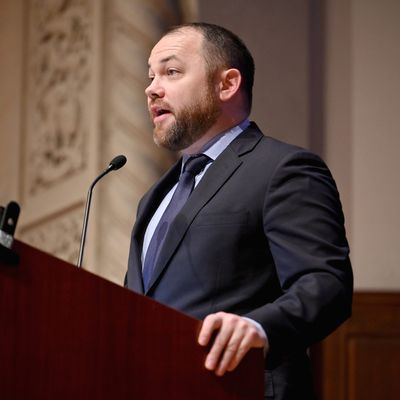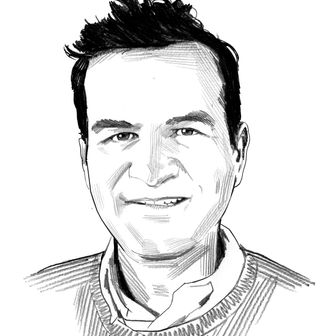
When the pandemic was first bearing down on New York City, before schools were closed or other elected officials were sounding the alarm, Corey Johnson was on the phone every night, usually until the early hours of the morning, with a neighbor of his, a data scientist and policy researcher who had modeled what coronavirus was likely to do to the city once it arrived in earnest.
What the models showed, before anyone called for schools to be shut down or even for the St. Patrick’s Day Parade to be canceled, was that this epidemic would devastate the city. So while other elected officials were calling for life to go on as normal and for New Yorkers to support their neighborhood bars and gyms, Johnson, the City Council Speaker, canceled his State of the City address and sent the entire council home to work remotely.
“I was trying to be an early voice out there, before other elected officials, I was trying to say that a category ten hurricane was heading our way,” Johnson said Thursday afternoon. “I feel like I was trying to warn everyone, and still everything went to shit.”
On Thursday, Johnson announced he was ending his campaign for mayor nine months before Election Day, saying he has been struggling with depression and mental-health issues over the past several months. The news was not entirely surprising — Johnson had been at the forefront of activist ire since the George Floyd protests this summer, when he failed to heed the call to cut $1 billion from the NYPD budget. Rumors had swirled for months that Johnson wasn’t going to run, but his leaving the mayoral race still represents a remarkable turn of events for someone who had burst onto the local political scene dancing with news anchors during interviews, leading parades like a drum major, videotaping himself singing along to Lady Gaga in a car, and promising to bring a rare spirit of joy to the drudgery of municipal governance.
Between March, when it was clear the coronavirus was here, and June, Johnson said he did not take a single day off, and he still hadn’t when he began to realize that “I was not myself. I was having feelings of sadness and isolation and a loss of joy and sleeplessness and no appetite and all of those things. I didn’t really feel like I could take a break.”
Johnson has been open about his past alcoholism and his HIV-positive status, and he had been in talk therapy for years but stopped going once the pandemic hit. In June, he started going again and realized he was in a rut, in the same month the city’s budget was due and the George Floyd protests were roiling New York and the nation.
“June is the crucial month for the City Council, and so I was maybe not feeling my best self. But I felt like I couldn’t really acknowledge that because there was just too much to do every single day,” Johnson said.
As the council debated the city’s budget, protesters started gathering outside the homes of local councilmembers, demanding greater cuts to the police. The home of Johnson’s boyfriend was vandalized on multiple occasions. After the budget passed, Johnson and his boyfriend, the photographer Ernest J. Martin, escaped to Cape Cod and Johnson crashed.
“The last time I felt this way was when I was a sixteen year old kid in the closet in a small town in Massachusetts. I just felt like I was not myself.”
As he weighed whether or not to continue with a campaign, Johnson dealt with a swirl of rumors that he wasn’t going to run, and that he had begun to take up drinking and drugs again. “I was being hounded by reporters for months. People were speculating, maybe my former political opponents were trying to use it to their advantage, I don’t know, but every day I was finding stories that I wasn’t sober any more, so in the midst of trying to get better and take care of myself there were these untrue rumors about me.”
In the end, running for mayor and running the City Council and dealing with his mental health was too much. Johnson wasn’t, he insists, hounded out of the race by the protests. He still thinks he had a chance to win, and if he were feeling better he easily could have run for another office lower down on the ballot “And I would have overwhelming odds of winning.”
Johnson said he doesn’t know what’s coming next for him. A future run may be in store, but for now, “I never felt like I needed to do this,” he acknowledged. “There are other ways I can be of service.”






























